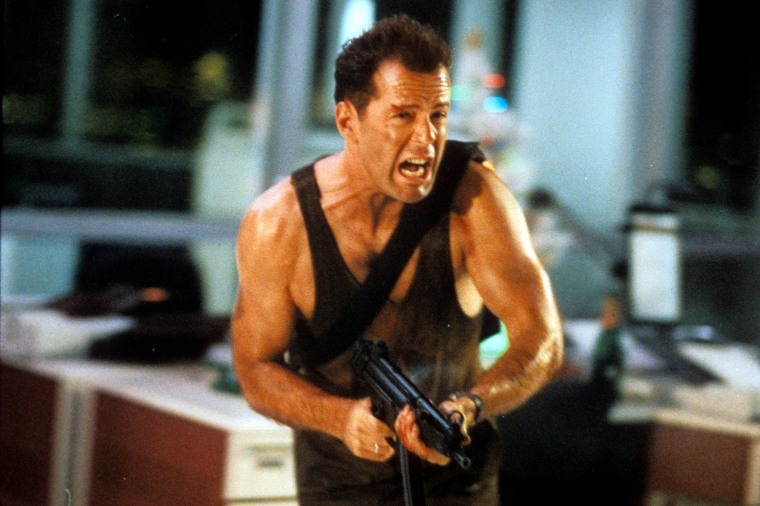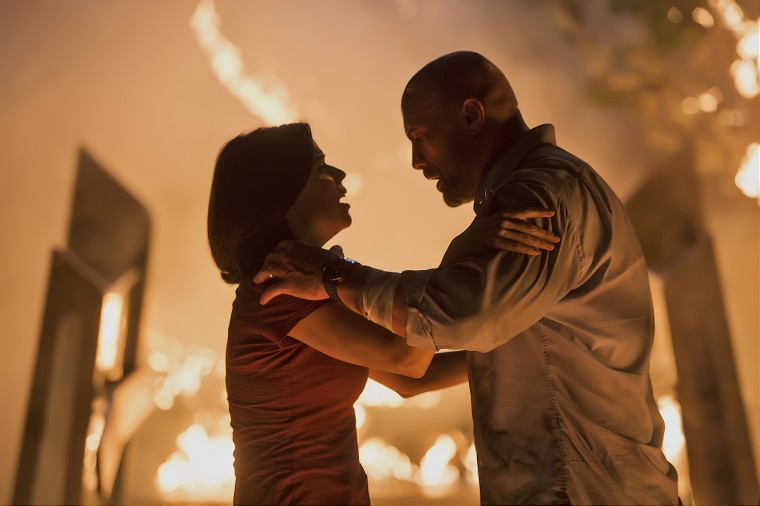The most famous skyscraper action film is also one of Hollywood's most overt depictions of wounded masculinity. In “Die Hard” (1988), off-duty New York cop John McClane (Bruce Willis) goes to a decadent Los Angeles high rise to try to win back his wife, who is pursuing a high-powered career in a Japanese-controlled company. When European terrorists attack the building, John gets to work out his marital insecurities in the typical Hollywood fashion by blasting away with various firearms. The film asserts the value of the white American working man with each spectacular explosion and dead foreigner.
But while “Die Hard” is driven by insecure masculinity, the latest giant building action movie, “Skyscraper” is adamantly not. (The film will be distributed domestically by NBCUniversal, the parent company of NBC News.) Dwayne Johnson, like Bruce Willis before him, is engaged in a life-or-death struggle with terrorists in an extremely tall, somewhat phallic structure. But unlike John McClane, Johnson's character, security consultant Will Sawyer, isn't anxious about his manhood. He's a happily married, successful small businessman, who performs astounding feats because he's in a situation where he has to perform astounding feats. Sawyer is worried about getting shot, and he's worried about his family, but he's not worried about being less than a man. He doesn't have anything to prove.
The massively muscled former wrestler has quietly but firmly asserted his distance from typical Hollywood masculinity throughout his career.
Johnson’s acting in “Skyscraper” isn’t going to win any Oscars. But it's still a pleasant change from the action movie default. In fact, the massively muscled former wrestler has quietly but firmly asserted his distance from typical Hollywood masculinity throughout his career.
Male protagonists in action films are often cocky and smug, desperately overcompensating for some tragic backstory — think Starlord (Chris Pratt) in "Guardians of the Galaxy." Johnson has played that character at times, as when he voiced Maui in Disney's "Moana." But in general he has cultivated a gentler oeuvre, with less desperate self-assertion.
For instance, in the recent scientifically modified monster movie “Rampage,” Johnson plays a shy zoologist who finds animals more understandable, and more trustworthy, than humans. Then there is his virtuoso turn in “Jumanji: Welcome to the Jungle” (2017), in which he plays a video game avatar magically inhabited by a nerdy high school student. Johnson seems to be having the time of his life as he unselfconsciously screams in terror when confronted with innocuous small furry jungle animals. Even better are the scenes in which Johnson flirts with an awkward sincerity, utterly devoid of braggadocio. "I'm…I'm really into you," he tells the girl he's really into. John McClane would blow up a building before he'd say that.
Will Sawyer in “Skyscraper” had the potential to follow a John McClane-esque narrative in which masculinity is threatened and inadequacies are eventually overcome. The film opens with a flashback in which Will, as head of a SWAT team, failed to save a little boy and ends up so badly injured his leg has to be amputated below the knee.
In many films (Sofia Coppola's Civil War drama “The Beguiled,” for example) a leg amputation is a symbolic castration. Sawyer is, by the usual Hollywood calculus, less than a man. The film never treats him that way, though. Instead, the woman who operated on Will's leg, Sarah (Neve Campbell), ends up becoming his wife. His artificial leg doesn't remind him of his inadequacy; it reminds him of his family. It's true that it slows him down, but it also his life a couple of times. It's a useful tool, not a spiritual wound.
Family, not manhood, remains Sawyer's main motivation throughout the film. Action movies often have secondary romance plots. Performing super stunts allows the guy to wow the girl, turning the film’s violence into a kind of masculine courtship ritual. In “Skyscraper,” though, Will and Sarah are already happily married. He's not trying to impress her. On the contrary, he is winningly vulnerable with her. In one sweet early scene he nervously asks her for reassurance before a big business meeting. She tells him he'll do great, teases him about his inability to tie a tie and then demands that he fix her cell phone.
Similarly, Sawyer isn't trying to win the love of his kids, or connect with them, as is sometimes the case with emotionally incompetent dads in action movies. Instead Sawyer plays a game in which he asks them. "Who does Daddy love?" and they both shout, "me!" It's a joke about reliability; it's funny because there's no doubt as to the answer.

In some ways, “Skyscraper” shows just how much action movies rely on anxious masculinity. Will is so comfortable in his own skin, and so little worried about proving himself, that the plot starts to sag. Action movies need the hero to be weak enough that he has a personal investment in hating and stomping the villain. In “Die Hard,” John McLane develops a very intimate loathing of foppish villain Hans Grubar (Alan Rickman), and the film becomes a kind of struggle for dominance between the oily European and the straightforward, no-nonsense American.
But Sawyer is completely uninterested in this kind of pissing contest. He just wants to rescue his family. The bad guy is a problem to be solved, like a broken elevator. He's a threat to Sawyer's family, but not to Sawyer's ego. The slow motion final fall of Hans Gruber in “Die Hard” is the film's vindictive money shot. The bad guy in “Skyscraper” gets his with almost no fanfare. Then Sawyer turns his attention immediately to his frightened daughter.
Sawyer is too happy with himself to be a typical action hero. His masculinity isn't dependent on hyperbolic display, and as a result all the leaping through windows and mowing down bad guys seems a bit superfluous. It's more fun to watch him flirt with his wife. The truth is that Johnson seems increasingly miscast in these big dumb action movies. He'd be perfect as a sweet, nerdy, protagonist in a smart “Say Anything”-style romantic comedy. Any leading man can scale a skyscraper. Fewer can convince you that they don't need to.
CORRECTION (July 16, 2018, 4:30 p.m.): An earlier version of this article misidentified the actor who stars in "Guardians of the Galaxy." It is Chris Pratt, not Chris Pine.
Noah Berlatsky is a freelance writer. He edits the online comics-and-culture website The Hooded Utilitarian and is the author of the book "Wonder Woman: Bondage and Feminism in the Marston/Peter Comics, 1941-1948."

